British dancer/choreographer Akram Khan is back in Taipei this weekend, making his third appearance since 2002 in the Novel Hall Dance Series. This time he has brought Flemish-Moroccan dancer/choreographer Sidi Larbi Cherkaoui with him, and their 2005 masterpiece, Zero Degrees.
Khan and Cherkaoui met in 2000 and hit it off immediately but it took a few years for their schedules to clear enough so that they could work together.
The genesis of Zero Degrees, however, was a harrowing train trip Khan took several years ago with a cousin across the India-Bangladesh border. Khan discovered the body of an old man in his railway car and heard the man's widow beseeching passengers for help in getting the body off the train. No one responded; they were afraid of being accused of involvement in the man's death.
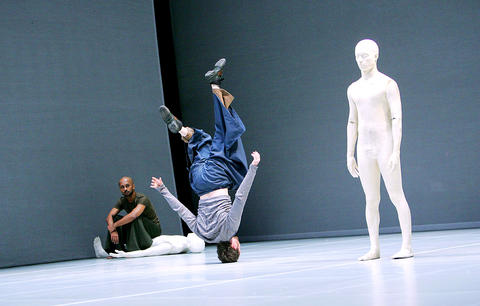
PHOTO: COURTESY OF TRISTAM KENTON AND JEAN PTERRE MAURIN
Khan wanted to help, but his cousin warned him not to risk getting tangled up in Indian bureaucracy. But he did have a moment of panic nevertheless as he watched the Indian border guards pass his British passport between themselves, fearing that he might somehow lose his passport, and by extension, his identity.
Khan has said in several interviews that Zero Degrees is about unseen moments and dual identities - the transition from life to death, from being someone to being no one - and "about the in-between space between everything."
Dual identities and transitions are a common bond between Khan and Cherkaoui. They are both Muslim, brought up in Europe and frequently explore cross-cultural issues in their work. While Khan was trained as a traditional Kathak dancer and then fused that with studies in contemporary dance, Cherkaoui is a talented acrobat, dancer and actor who choreographed for the Flemish dance/theatre collective Les Ballets C de la B until last year.
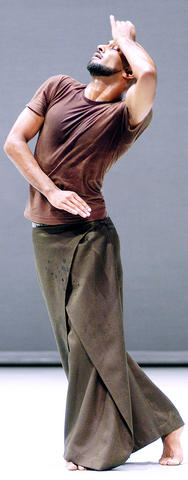
PHOTO: COURTESY OF TRISTAM KENTON AND JEAN PTERRE MAURIN
The pair is a study in contrasts physically. Khan is darker-skinned, compact and wiry, a tightly controlled whirlwind. Cherkaoui is taller, looser-limbed and so pale you might think he has spent years locked up in some windowless computer laboratory.
Zero Degrees begins with Khan and Cherkaoui sitting side by side at the front of the stage, recounting a tale of passports, trains and a body in perfect unison, with tightly synchronized gestures that are at once an extension of each other's movements and mirror images.
Cherkaoui has said that it took them three weeks to achieve five minutes of synchronized choreography, something to keep in mind while watching them weave their arms, hands and later their bodies through the air.
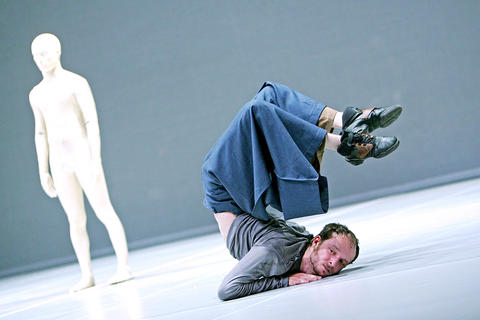
PHOTO: COURTESY OF TRISTAM KENTON AND JEAN PTERRE MAURIN
While it is just the two men who can be seen on the stage, the piece was a team effort: Khan, Cherkaoui, musician and composer Nitin Sawhney and sculptor Antony Gormley, who did the sets and created the white foam dummies that get dragged and pummeled in the course of the dance. Four musicians are heard, but barely seen behind the white scrim that serves as a backdrop.
Zero Degrees premiered just days after the London subway bombings in 2005. Khan has said that the bombings made the piece even more relevant for him because as a Muslim of Bangladeshi heritage, he became very conscious of his skin, his color and his bag, when making the 90-minute commute from his Wimbledon home to his south London office.
He readily admits his work is becoming darker. He's also striving to make it more real. Certainly death has become a reoccurring theme, as it was in Lost Shadows, the piece he created for Cloud Gate Dance Theater earlier this year.
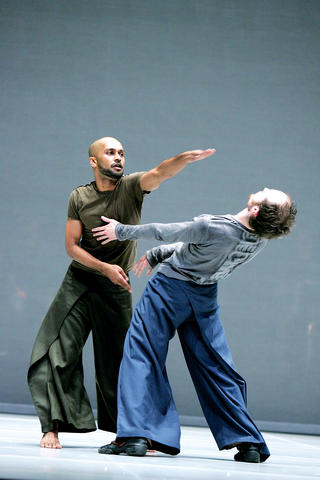
PHOTO: COURTESY OF TRISTAM KENTON AND JEAN PTERRE MAURIN
"For me it's a form of therapy to create a piece of work, a way of dealing with what's happening in the rest of the world," he said at a forum in Taipei in March.
With Zero Degrees, he told another interviewer, "each time I do the piece and I say the story, it's almost like a therapy."
Khan took three years "out" from his company to create a trio of duets. Zero Degrees was the first. The second was 2006's Sacred Monsters with French prima ballerina Sylvie Guillem. The third, Gnosis with French actress Juliette Binoche, will premiere next spring in London.
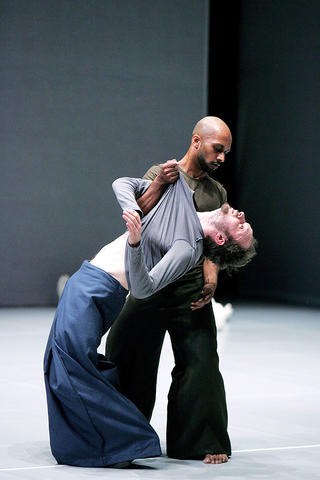
PHOTO: COURTESY OF TRISTAM KENTON AND JEAN PTERRE MAURIN
"Shifting back and forth like a tennis ball, I exist when I am on the move," he said. He certainly has been on the move this year, bouncing around the globe.
"Always in motion, [it's] always the movement," he said. "When I stop [working on a piece], when it becomes set in concrete, then I lose who I am."
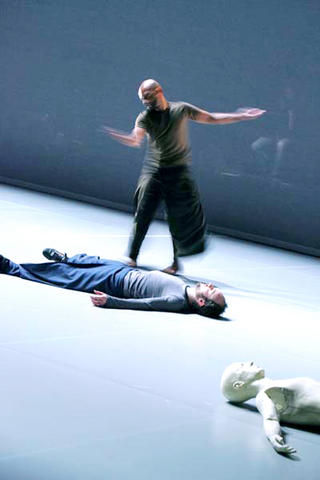
PHOTO: COURTESY OF TRISTAM KENTON AND JEAN PTERRE MAURIN

Dec. 9 to Dec. 15 When architect Lee Chung-yao (李重耀) heard that the Xinbeitou Train Station was to be demolished in 1988 for the MRT’s Tamsui line, he immediately reached out to the owner of Taiwan Folk Village (台灣民俗村). Lee had been advising Shih Chin-shan (施金山) on his pet project, a 52-hectare theme park in Changhua County that aimed to showcase traditional Taiwanese architecture, crafts and culture. Shih had wanted to build all the structures from scratch, but Lee convinced him to acquire historic properties and move them to the park grounds. Although the Cultural

The Taipei Times reported last week that housing transactions fell 15.3 percent last month, to under 20,000 units. However, the market boomed for the first eight months of the year, and observers expect it to show growth for the year as a whole. The fall was due to Central Bank intervention. “The negative impact of credit controls grew evident for the third straight month,” said Sinyi Realty Inc (信義房屋) research manager Tseng Ching-ter (曾敬德), according to the report. Central Bank Governor Yang Chin-long (楊金龍) in October said that the Central Bank implemented selective credit controls in September to cool the housing

During the Japanese colonial era, remote mountain villages were almost exclusively populated by indigenous residents. Deep in the mountains of Chiayi County, however, was a settlement of Hakka families who braved the harsh living conditions and relative isolation to eke out a living processing camphor. As the industry declined, the village’s homes and offices were abandoned one by one, leaving us with a glimpse of a lifestyle that no longer exists. Even today, it takes between four and six hours to walk in to Baisyue Village (白雪村), and the village is so far up in the Chiayi mountains that it’s actually

The results of the 2024 US presidential election rattled the country and sent shockwaves across the world — or were cause for celebration, depending on who you ask. Is it any surprise then that the Merriam-Webster word of the year is “polarization?” “Polarization means division, but it’s a very specific kind of division,” said Peter Sokolowski, Merriam-Webster’s editor at large, in an exclusive interview ahead of Monday’s announcement. “Polarization means that we are tending toward the extremes rather than toward the center.” The election was so divisive, many American voters went to the polls with a feeling that the opposing candidate was